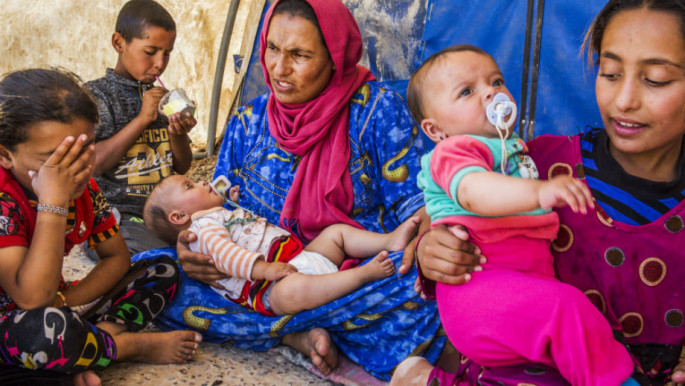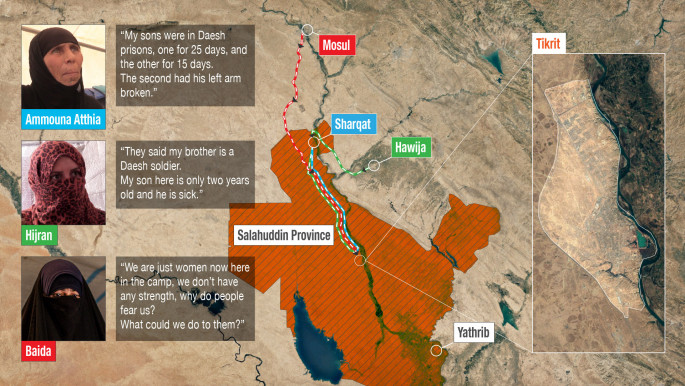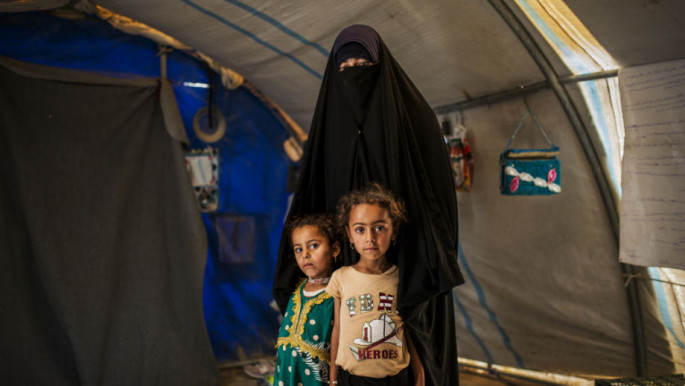Awaiting judgement: Meeting the Islamic State families held in desert camps
This is the gateway to al-Shaham Camp, near the city of Tikrit, two hours north of the capital, Baghdad.
But this camp is not like many others, dotted across Iraq, in which people are hosted according to from which geographical area they fled.
Locals here call al-Shaham "the ISIS camp". Most of the camp's residents have several family members in prison. They are displaced - but they are also detained. These are the "ISIS families" - they are here whether their sons or husbands or fathers joined up by choice or by force, whether they were fighters or leaders, administrative employees or drivers. War criminal or cook.
While one part of this camp hosts families who lost their homes in the battle against the Islamic State group, or who fear revenge attacks by IS in their hometowns, a separate area of the al-Shaham camp - where families mostly from Hawija and Sharqiyya are housed in tents - is completely closed off.
It is an open-air prison for children and women of all ages, with a few adult males. They cannot leave and do not know what the future may hold. They know they are considered IS family members, and as relatives of terrorists, they are no longer allowed to live as any other citizen in Iraq.
 |
| In pictures: Click here for Alessio Mamo's photo-essay from the al-Shaham desert camp [Alessio Mamo] |
They are just waiting, in limbo, having fallen through the cracks of Iraqi justice. Officials here treat them as if all are guilty of the crimes their relatives are alleged to have committed. If a person belongs to a tribe in which the majority supported the Islamic State group, the whole family is considered "an ISIS family".
Hijran is from Hawija. She was stopped at a checkpoint and was held in Sharqat for two days.
"They said my brother is a Daesh soldier, that's why I should stay here," she told The New Arab, using the Arab acronym for the Islamic State group.
"My son here with me is only two years old and he is sick, he would need an operation to get better soon. The other son is a year older than him, but he is with my family. I would have joined my mother and the rest of my family in Al-Alam, but I have been stuck here for 18 months."
Hijran is 28 years old and was married to a man who was also accused of being an IS member.
"I will tell you the truth: yes, my brother was with Daesh. They convinced him, but still he has civilian clothes [ie: not a 'fighter']. But my husband? No! He never had any connection with them. They imprisoned him as they did with many innocent men in the country. Where is he now? And why should I still be here?"
She covered her mouth with her hijab and hid her tears under the same veil for a few seconds.
| Feature continues after video |
| |
| Watch now: A rare glimpse inside al-Shaham camp as Hijran shares her story |
Iraqi federal authorities appear not to have made any efforts to inform family members about the location of detainees - be they in prisons, camps, makeshift detention centers, checkpoints, or screening sites. An estimated 20,000 people are detained throughout Iraq, and no prompt independent judicial review of detention was ever guaranteed - or likely.
Not all detainees are allowed access to lawyers or medical care - let alone permitted to communicate with their families. The majority were arrested during the long battle for Mosul and the military campaign to clear IS from the one-third of Iraqi territory it had occupied for three years.
Iraqi federal authorities also never made public the number of fighters and civilians it had detained, nor the legal basis for their detention, including the charges against them.
They have instead been languishing in jail cells or desert camps, like here in al-Shaham Camp.
Hijran's day-to-day life with her son is far from easy. She is alone in the tent with the toddler. The New Arab spoke to a senior aid worker and the camp manager. The camp has no clinic, no school, and lacks adequate sanitation services - as well as a widespread lack of food, water and heating oil.
Dust covers nearly everything. But Hijran suffers most due to the isolation.
"We, the residents of the camp, are not allowed to leave or to have mobile phones, and visitors are restricted," she told The New Arab.
 |
Some other camp residents from the initial wave of families from Hawija said that until the al-Sharqat families arrived they had been allowed to have phones, and to leave the camp at will. Now Hijran cannot even talk to her mother for news of her elder son. Hijran applied formally through the camp authorities to transfer to another camp, near Kirkuk where she has some family members.
But her request was rejected, and she will remain in the camp.
Many women in the camps are frequently subjected to sexual harrassment and violence, including rape and widespread sexual exploitation by armed men, camp authorities or other residents of the camps, according to an Amnesty International report.
"I never lived or passed through any sexual violence," said Hijran. "If it happened, I would have told the organisations."
Hijran continues in a whisper, looking behind her at the entrance of her tent, afraid of someone listening.
"But the soldiers speak to us, they provoke us, to understand who 'would do it' for money or not… we face verbal harrassment and intimidation. I am afraid. I am not comfortable and I will not be until I will go out from here."
Al-Shaham camp is Hijran's prison. In the meantime, as many as 1,000 women - together with 820 infants and some more yet to be born - are being held in Iraq's Correctional Centres, as the official prisons are called. They are accused of being IS "women affiliates" and most are allegedly foreign fighters from Europe, Russia or Central Asia.
According to the 2005 Iraqi Counterterrorism Law, prisoners could be given a sentence of between fifteen years to life or the death penalty. At the Central Criminal Court in Baghdad, the judges sit at nine o'clock every morning and finish at three in the afternoon, Sunday to Thursday. It will take years to process all the detainees in this way.
So far, around 3,000 trials have been completed, with 98 percent convicted. The others wait in prisons or in the camps such as al-Shaham, where the residents detained do not know if they will ever sit in front of a judge. As "ISIS families", they do not know their legal status.
 |
On average, the hearings last ten minutes and the prisoner's life depends on that... About 300 executions have already been carried out. Lawyers are afraid to appeal such sentences for appearing to be a Daesh supporter themselves |  |
A lawyer from Baghdad's Criminal Court, Firas al-Khazali, is not optimistic about the fate of prisoners in front of the under-pressure judges.
"On average, the hearings last ten minutes and the prisoner's life depends on that quick questioning. They have already passed though an investigation hearing in other smaller courts. The problem is that the reports out of the investigation hearings are confessions often pushed out under torture," he told The New Arab.
"About three hundred executions have been already carried out, without appeal from any lawyers - who are afraid of defending IS members, even if they believe they are innocent. Even the judges and the attorneys of the office are in turn afraid of retaliation as well as being accused of being of IS supporters."
Ammouna Mohammed Atthia, another woman held at the al-Shaham camp, says her two sons were IS opponents, not IS fighters, and have been framed.
"One son was arrested and accused of being a Daesh member, but he is not," she told The New Arab. "In the past year-and-a-half I was allowed only to visit him once. I cannot call to the prison, I am not allowed to have a phone here. I only know he is in a prison for terrorists in Tikrit."
Atthia's family is also the victim of a parallel justice system in Iraq, that of clans' revenge. She claims her son's first arrest was due to one clan exacting revenge against another. Back in 2009 a fight divided a local clan in the city of Sharqat in Salahuddin province - and when IS entered the area in 2014, she says her son was smeared by the rival clan with a baseless allegation of membership of the militant group.
"My sons were in Daesh prisons, one for 25 days, and the other for 15 days. The second had his left arm broken."
 |
| In pictures: Click here for Alessio Mamo's photo-essay from the al-Shaham desert prison camp [Alessio Mamo] |
But when the Shia militia known as the Popular Mobilisation Forces [Hashd al-Shaabi in Arabic] entered Sharqat - a Sunni tribal stronghold in central Iraq - to retake it from IS, there was only space for their revenge: Shia against Sunni.
"They took my house, my sheep, my cattle, everything I owned," she said. "They told me 'enti daeshiyya' - 'you're a Daesh member!' My [eldest] son had been chatting with some IS members. He was a butcher and had no choice in his work. But he was not a member, not wearing the qandahari [paramilitary uniform] or carrying weapons."
Atthia is saddened when asked about the recent Iraqi elections. "We could not vote, we don't have choices, we don't know about our future. We don't have anything here."
The Iraqi government claimed victory over IS in Iraq last December, but the group's presence can still be felt throughout the country. Terrorist attacks continue to shake Iraq on a weekly basis, while security forces arrest more suspected IS members in Mosul and across Iraq every day. At the Syrian-Iraqi border, in the desert areas where most of the remaining IS fighters are believed to operate, the battle never ended.
But the longest battle in Iraq will be one of dealing out justice to the architects of the most brutal violence, and those who supported and enabled them, while freeing those innocents who have simply been swept up in the crackdown on militants.
| Feature continues after video |
| Watch now: Ammouna Mohammed Atthia tells her story |
In August 2018 a UN team of investigators began work, collecting evidence of war crimes, crimes against humanity or genocide particularly against Yazidi people and other minorities, for use in Iraqi trials of suspected IS militants.
The Iraqi government has not yet approved the UN team to also investigate war crimes committed by the Iraqi army and militias such as the PMF during and after the battle against IS.
With Atthia and other residents of Sharqat, not to mention the dozens of towns like it, having survived the violent rule of the Islamic State group, only to then endure the violence of the PMF and the Iraqi army - the fundamentally flawed screening process and subsequent arbitrary arrests; the thousands of men and boys who have been forcibly disappeared by Iraqi and Kurdish forces since 2014 - another cycle of revenge is impossible to rule out.
 |
We are just women now here in the camp, we don't have any strength, why do people fear us? What could we do to them? |  |
Baida misses her husband.
"There is no woman who can hate her husband. I can only miss him, of course," she tells The New Arab. Baida was born in 1985 and is originally from Yathrib, in Salahuddin governatorate.
After the Iraqi army killed her husband's brother, he joined the Islamic State group to become a fighter and take revenge against the military, pledging allegiance to the self-proclaimed caliph, Abu Bakr al-Baghdadi.
From Yathrib they moved to Mosul. They first lived, wife and husband, together with their three children, in East Mosul, moving to West Mosul when the army, backed by international air support, re-took the east of the city stronghold.
They were soon forced to leave the labyrinthine west of the city, amid a fierce battle and heavy bombing. Her husband was arrested. When she escaped, she headed first for Kirkuk - but soldiers at one checkpoint asked her name and so revealed the identity of her IS fighter husband. They took her to al-Shaham camp.
The manager received her and asked her to tell her story. "We were simply farmers before all of this," she told the official. "We did not know ISIS. But this is the will of God, this is what Allah has written."
Baida covers her face with a niqab, while her children learn Quranic verses on a handmade blackboard inside the tent. Other women from neighbouring tents fill Baida's shelter tent and want to intervene in the conversation. Noura, a woman from Hawija, said she tried to rebel against her husband: "I wanted to convince him that being with Daesh was not a right choice. But he simply reacted like this: it's not your business. And so I stayed with my children at home. Two of them were killed in the bombings."
Baida agrees with her. She thought she had no power over her husband to force him not to join the Islamic State group. "We are just women now here in the camp, we don't have any strength, why do people fear us? What could we do to them?"
Not only is being detained in the al-Shaham camp ostensibly a punishment for crimes committed by others, many women here maintain they had no choice but to go along with their husband's decision to join up with the terrorist group.
Neither Hijran nor Atthia nor Baida knows if their case will ever be dealt with by a court, or for how long they will stay in al-Shaham camp.
"We are paying the price for what ISIS did," Baida said, holding her daughter tight. "Other people managed to escape and travelled abroad. We are still here, we have nothing other than Allah."
Marta Bellingreri, Laura Battaglia and Alessio Mamo are a multimedia team of journalists currently operating in Iraq.
Marta Bellingreri is a freelance researcher and writer, with a PhD focused on gender studies in the Middle East. Follow her on Twitter: @MartaDafne
Laura Battaglia is a video journalist and documentary filmmaker. She spends her time roughly split between Milan and Sanaa. Check out her website: Battgirl
Alessio Mamo is a Sicilian photojournalist focused on matters of social, political and economic importance. He was a second-placed winner in the People category of the World Press Photo Awards 2018.
Follow his work on Twitter: @AlessioMamo



